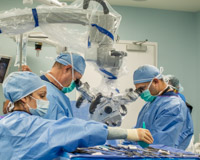Undergoing a knee replacement surgery, also known as knee arthroplasty, is a big decision to make. Plus, there are a lot of options for knee surgeons out there, so it can be confusing for patients to decide who to see for their care.
At DISC, we know how important it is for patients to develop a rapport not just with their surgeons, but with their entire care team — which is why everyone from our expert orthopedic surgeons to our clinical staff and coordinators will invest the time to get to know you and your goals, and care for you through the entire process, starting with the initial consultation and working through the post-operative recovery.
Knee Replacement/Arthroplasty Overview:
A knee arthroplasty is a procedure that replaces damaged, worn or diseased knee joint surfaces with artificial materials. You may be a good candidate for knee replacement surgery if you’re grappling with severe knee pain or limited mobility due to conditions such as osteoarthritis, rheumatoid arthritis, or post-traumatic arthritis. The procedure aims to alleviate pain, improve function, and enhance overall quality of life by replacing damaged portions of the knee joint.
Video: Knee Arthroscopy Patient, Coco Zurita
Knee Symptoms Arthroplasty May Help:
A patient may be a good candidate for knee replacement surgery if they experience any or all of the following symptoms:
- Persistent Knee Pain: Ongoing and severe knee pain, especially during weight-bearing activities or even at rest.
- Reduced Mobility: Difficulty walking, climbing stairs, or performing routine activities due to knee stiffness or limited range of motion.
- Swelling and Inflammation: Chronic swelling and inflammation in the knee joint that doesn't respond to conservative treatments.
- Joint Deformity: Noticeable changes in knee structure or deformities that impact function.
Treatment: Non-Invasive Options and Knee Arthroplasty
Non-invasive treatment options are usually attempted before considering a knee arthroplasty.
Common non-surgical treatment options include:
- Lifestyle Modifications: Changes to a patient’s lifestyle such as weight management, low-impact exercises, and using assistive devices.
- Medications and injections: Using pain relievers, anti-inflammatories, and injections to manage symptoms
- Physical Therapy: Exercises to strengthen the muscles around the knee and improve joint flexibility may be helpful in managing pain.
When conservative care isn’t enough to relieve the pain, it may be time to consider surgery. An orthopedic surgeon will give the patient a thorough assessment to evaluate the severity of the condition, the impact on the patient’s quality of life, and the success or failure of any non-surgical treatments tried previously. The surgeon will discuss the risks, benefits and expected outcomes of the procedure to determine if the patient is a suitable candidate for knee replacement surgery.
Our expert orthopedic surgeons use minimally-invasive techniques that require less down-time for recovery. Many patients are referred to DISC after failed knee replacements, and our experts can provide valuable insights to break down how the failure happened and how to treat it and prevent it from happening again.
A knee arthroplasty involves removing damaged portions of the knee joint and replacing them with artificial implants made of metal alloys, high-grade plastics, or polymers. There are a few different types of knee replacement procedures, including total knee replacement and partial knee replacement.
What makes DISC’s techniques for knee arthroplasty unique:
- Patients are up and moving shortly after surgery: Our expert orthopedic surgeons use minimally-invasive techniques that require less down-time for recovery. Immediately after surgery, the DISC care team will have the patient get up, bend the knee, and keep the range of motion fluid.
- DISC surgeons perform robotic-assisted knee replacements: This tool allows the surgeons to execute an accurate and precise surgery — one that can be personalized to each individual patient. With the use of robotics, DISC’s expert surgeons can map out a patient’s knee, measure the tension of their ligaments, and fine-tune their adjustments for a precise plan with the chosen implants.
- They use artificial intelligence to improve patient care: Our expert orthopedic surgeons are building out artificial intelligence algorithms that can monitor patients before and after surgery and help provide some predictive analytics so their patients feel supported and receive the best possible care.
Knee Arthroplasty/Replacement Recovery:
A minimally invasive approach to knee replacement surgery and similar conditions results in a shorter recovery period so patients can get back to living their lives pain free.
The DISC team supports patients at every step of the way through recovering from a knee replacement, which usually involves a progressive protocol where activity is slowly built back into your routine over time. Recovery from knee replacement surgery varies, and there may be physical therapy rehabilitation and long-term management to maintain the benefits of the surgery. Ongoing exercises and lifestyle adjustments to regain strength, mobility and range of motion after surgery is crucial to ensuring a successful recovery.
Knee arthroplasty can be a life-changing intervention for those suffering from debilitating knee pain, but it’s important to speak to an orthopedic surgeon to determine the best options for your unique needs. If you’re frustrated by your knee pain and don’t know the root cause, schedule a consultation with one of DISC’s leading orthopedic experts so you can get back to enjoying life pain-free.

About the author
discmdgroup DISC Sports & Spine Center (DISC) is a national leader in minimally invasive spine surgery, orthopedic surgery, and sports medicine care. Our spine surgeons set the standard in artificial disc replacement, spine fusion, discectomy, microdiscectomy and the full spectrum of spine procedures. The group’s orthopedic surgeons advance the state of joint preservation surgery and total joint replacement, including total knee replacement as well as total hip replacement. Our flagship surgery centers based in Newport Beach, Marina del Rey, and Carlsbad serve patients local to Los Angeles, Orange County and San Diego, as well as the rest of the country. Read more articles by discmdgroup.





